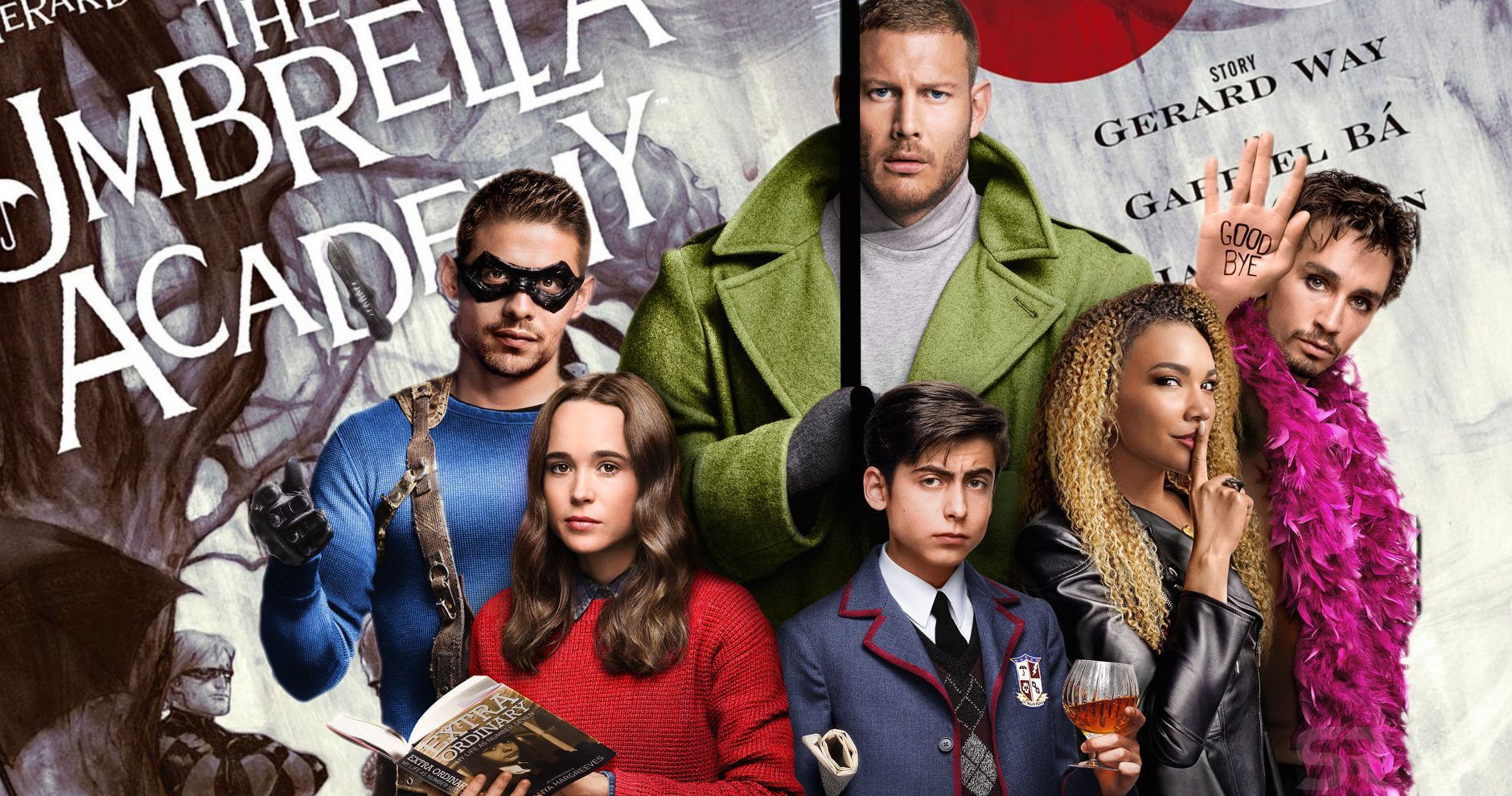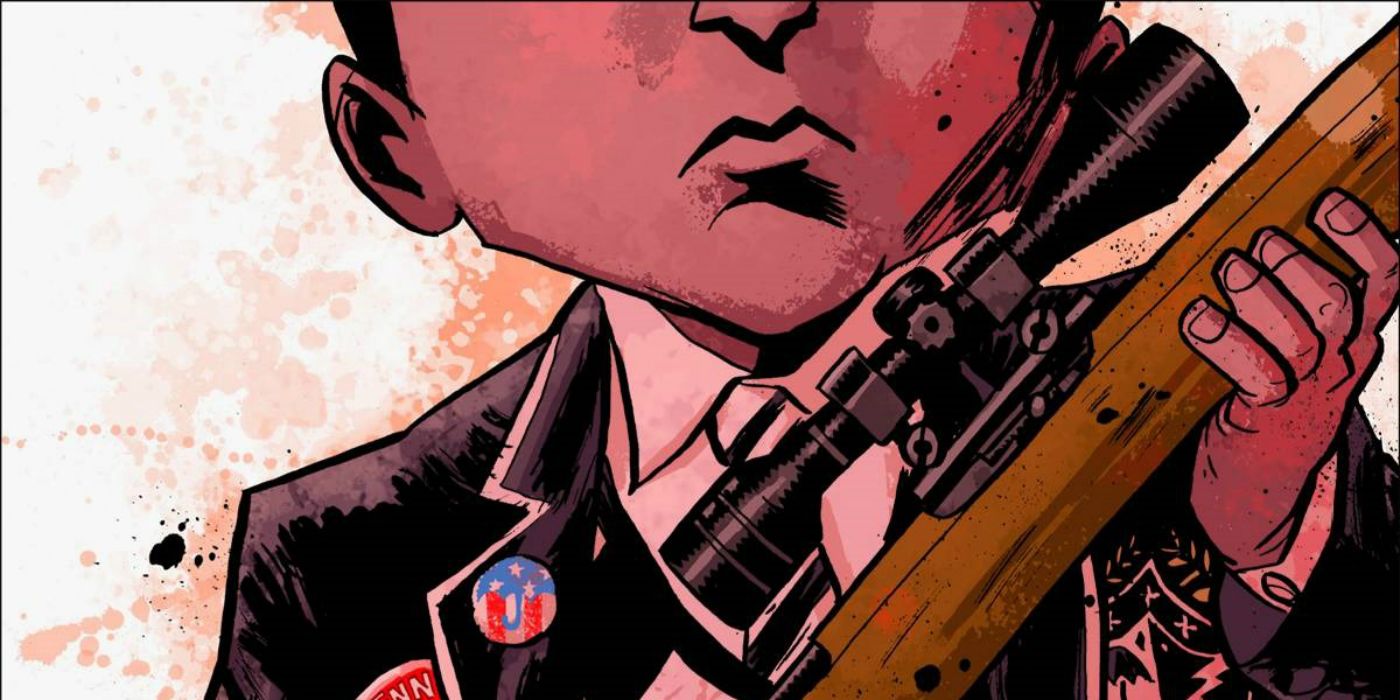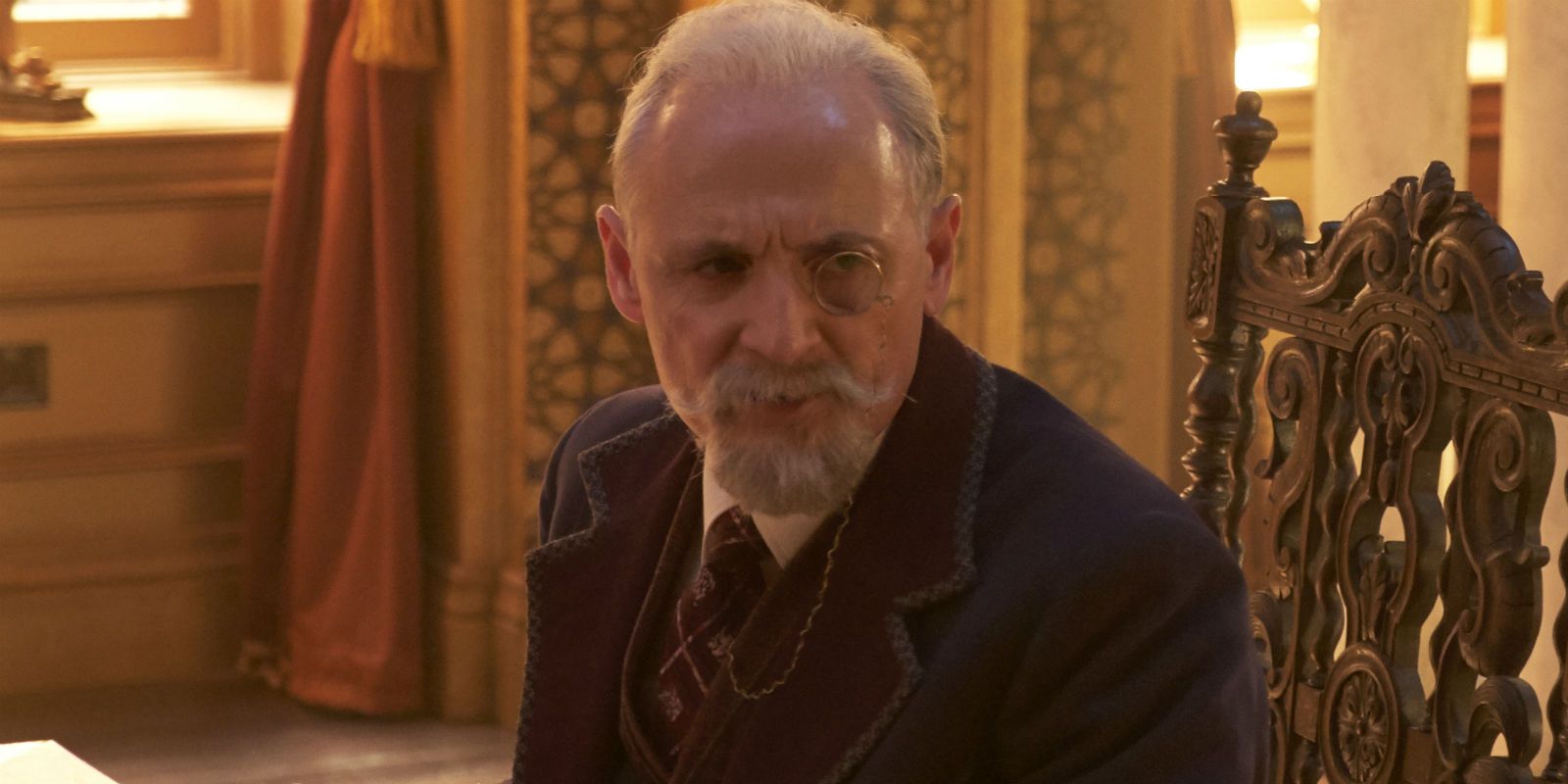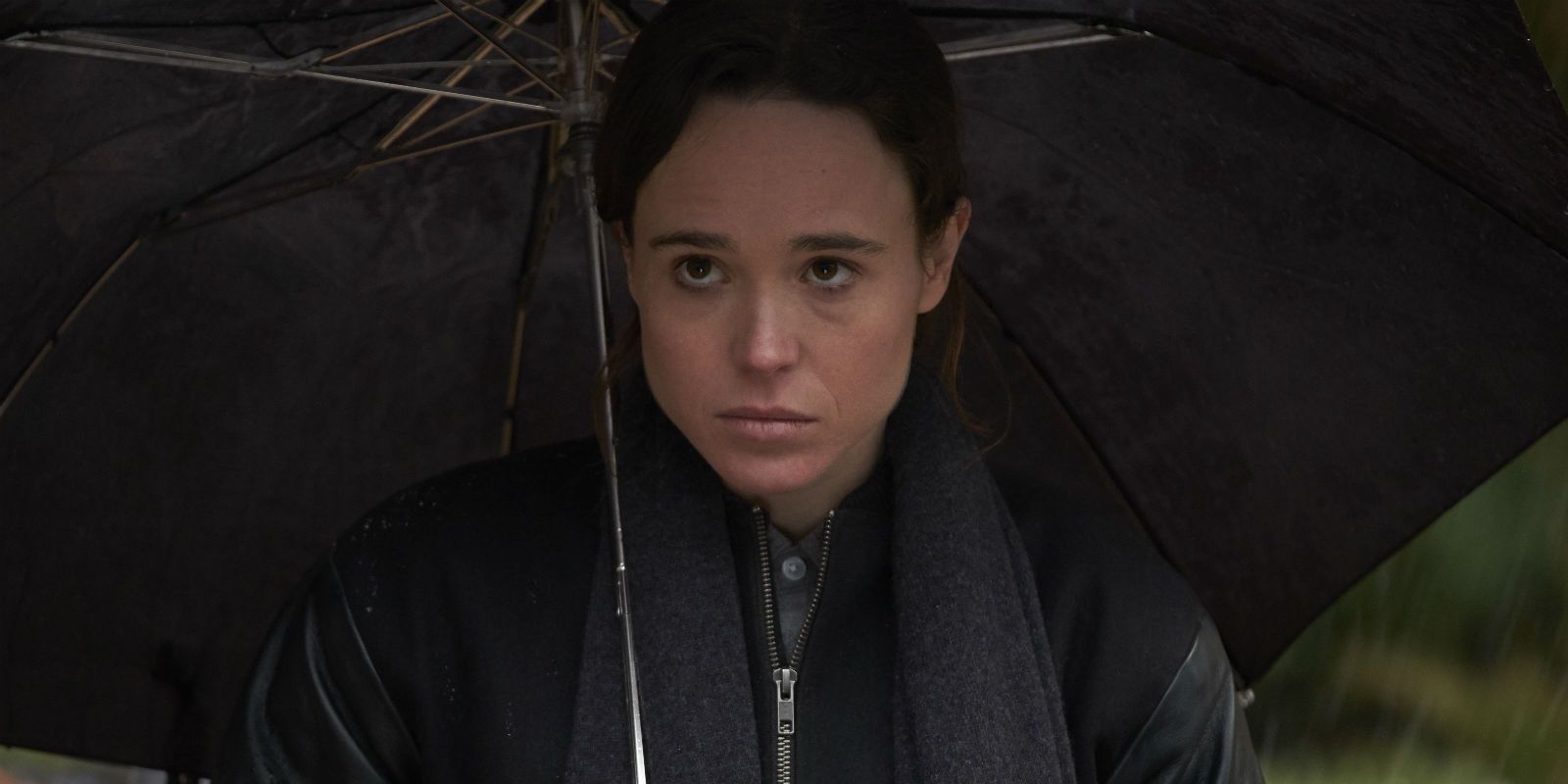Netflix's live-action adaptation of The Umbrella Academy is even better than the original comics. The story of The Umbrella Academy begins back in 2007, when Gerard Way and Gabriel Bá worked together on the first Umbrella Academy miniseries. Strongly influenced by Grant Morrison's Doom Patrol, the comics introduced readers to a trippy superhero world that subverted the genre in fascinating new ways.
The first miniseries, The Umbrella Academy: Apocalypse Suite, proved to be an absolute hit, even winning the 2008 Eisner Award for Best Finite Series/Limited Series. It was followed up by a second miniseries in 2008, The Umbrella Academy: Dallas. Unfortunately for fans, over the next few years Way moved away from comics to further his musical career. It wasn't until late 2018 that the third miniseries, The Umbrella Academy: Hotel Oblivion, was released. That story ends on a cliffhanger, clearly setting up the next chapter.
Related: The Umbrella Academy Season 1's Ending Explained
Over the last couple of decades, comic book adaptations have become a big business. In 2017, Netflix acquired the development rights for The Umbrella Academy TV series, with Way and Bá signing up as executive producers and Fargo's Steve Blackman tapped as showrunner. The Umbrella Academy season 1 has finally debuted on Netflix, and lifts liberally from the first two comic book arcs, Apocalypse Suite and Dallas. At the same time, though, it takes some pretty substantial liberties with the comics in order to weave the narrative into a ten-episode, character-rich format. Let's take a look at what's changed, and what's stayed the same.
- This Page: The Similarities And Differences Between The Comics And The TV Series
- Page 2: Why The TV Series Is Better Than The Comics
The Umbrella Academy Honors The Original Comics
The Umbrella Academy begins with the birth of 43 super-powered babies - children of women who had previously shown no sign of pregnancy. Eccentric billionaire Sir Reginald Hargreeves believed these babies would have remarkable potential, and he traveled the world seeking out the surviving infants, attempting to persuade their mothers to give them up. He managed to acquire seven of them, and established the Umbrella Academy to train them as heroes. A harsh, unloving taskmaster, Hargreeves was a poor father-figure, and he brought them up to be emotionally stunted individuals. This backstory is common between both the comics and the TV series, as are the members of the Umbrella Academy.
All seven of the Umbrella Academy students are faithfully produced on Netflix, albeit with deeper characterization. Luther is portrayed as a Captain America figure; one line of dialogue even lampshades the famous "I can do this all day" line. Diego is an emotionally stunted rogue who possesses something of a knife fetish. Allison is a woman whose power has given her the ability to get whatever she wants, including a marriage and a child, but whose world has fallen apart with her husband suing for divorce. Klaus is a drug addict who has the ability to communicate with the dead. Five is a time-traveling adult assassin now trapped in the body of a child. Ben is dead. And then there's Vanya, a character whose story has been simplified and tightened up to work in the series.
Related: The Umbrella Academy Character & Powers Guide
The plot of The Umbrella Academy is pretty close to the original Apocalypse Suite comic, right down to Vanya's powers knocking a chunk out of the Moon; it's been blended with the Dallas arc, in which Five revealed that he'd secretly worked for an organisation he called the Temps Aeternalis. They've been substituted for the Commission in the Netflix show, a smart move that makes their members more relatable. Several of the key arcs are straightforward adaptations, with Klaus even spending time in the Vietnam War in a similar (but not identical) way to the comics.
The Umbrella Academy Changed A Lot From The Comics
And yet, while the basic concepts are all the same, they've been rendered a little less fantastical in The Umbrella Academy TV show. Way's Umbrella Academy comics were filled with some absolutely crazy ideas, ranging from wrestling matches with alien squids to the Eiffel Tower secretly being a spaceship. These concepts have been dropped in order to make the show just a little more realistic. Meanwhile, the same approach has been taken to the Umbrella Academy's powers; the most notable alterations have been made to Allison and Klaus. In the Umbrella Academy comics, Allison's words bend reality to her will; in The Umbrella Academy show, they bend the wills and emotions of others instead.
Meanwhile, Klaus' power has been simplified, leaving him only able to communicate with the dead. Klaus is a telekinetic in the comics, and someone who loses his powers whenever he wears a pair of shoes. In The Apocalypse Suite, he single-handedly prevented the chunk of Moon-rock hitting the Earth - a very different end to the story. Sir Reginald Hargreeves is very different as well. Way imagined Sir Reginald as being a lizard-like alien who's wearing the form of a man, and has no love for anyone. In contrast, the Sir Reginald of The Umbrella Academy is most definitely a human being, albeit one who's deeply scarred from the death of his wife. A handful of scenes suggest that Sir Reginald did really care about his children; he just didn't have a clue how to show it. That most certainly wasn't the case in the comics, where he judged the children as little more than tools.
Vanya's story has been completely rewritten. In The Apocalypse Suite, she'd fallen under the sway of the Orchestra Verdammten, who aimed to destroy the entire world with music. In The Umbrella Academy series, though, poor Vanya winds up being manipulated by a single man, Leonard Peabody. Her journey ends in a similar place, though, with Vanya possessing great power and almost bringing the world to an end as she adopts the identity of the White Violin. Meanwhile, another significant rewrite is that it's implied Number Five killed JFK in the world of The Umbrella Academy. Comparatively, the Dallas miniseries saw him go rogue and attempt to save the President instead.
Hazel and Cha-Cha are particularly interesting characters. In the comics, they appeared only briefly, and were frankly two-dimensional at best; in fact, they unwittingly destroyed the entire planet when they stole a nuclear device, although that particular timeline was rewritten. However, Hazel and Cha-Cha are as much stars of The Umbrella Academy series as the students themselves, and Hazel has an entire romance arc that has no comic book basis at all.
Page 2 of 2: Why The Umbrella Academy Is Better Than The Comics
The Umbrella Academy Is Better Than The Comics
Readers often campaign for adaptations to be as comic-book-accurate as possible, but in the case of The Umbrella Academy the TV series really is better than the comics. In part that's a natural consequence of this being a 10-episode series, which gives the characters a lot more time to breathe and the plot a lot more time to move than any five-issue miniseries. But it's also because the story has been streamlined a little, with elements from both The Apocalypse Suite and Dallas brought together into a single cohesive narrative. It's true that the Netflix series is a lot less fantastical; and yet, oddly enough that works very well indeed. The Umbrella Academy is far more effective precisely because it's set in a world a little more like ours, without alien squid wrestling matches and the like. Luther's arc in particular is far stronger; the revelation that Hargreeves sent him to the Moon for no purpose at all is absolutely staggering, and much more important to the plot than his Moon mission in the comics.
The real strength of The Umbrella Academy is its characterization. The decision to replace the Temps Aeternalis with the Commission, and the Orchestra Verdammten with Leonard Peabody, creates a story that's a lot more intimate. The relationship between Vanya and Leonard is particularly effective, given that even comic book fans won't be able to deduce where things are headed. At first Leonard is sweet, and the romance between the two is touching. But it quickly turns sinister - and ultimately deeply abusive. Meanwhile, the dynamic between Allison and Vanya feels like the emotional center of the story, as the two sisters are reunited but ultimately fracture once again - coming to a shocking climax when Vanya slashes her sister's throat. That idea is lifted straight from the comics, but plays out in a far more powerful way. Sterling performances by Ellen Page and Emmy Raver-Lampman really sell the scene.
Related: The Umbrella Academy Review: Super-Weird Heroes Deliver A Superbly Entertaining Series
There are plenty of times when Five feels like he's the star of the show. His plot mirrors that of Dallas, but it's helped by the fact that the Commission feels a lot more potent a threat than the exaggerated Temps Aeternalis. The Umbrella Academy certainly gives Aidan Gallagher plenty of time to shine, including a wealth of action scenes in which he takes on various Commission thugs and attempts to outwit The Handler. Meanwhile, the use of Hazel and Cha-Cha is absolutely inspired. As noted, these are fairly one-note villains in the comics, but The Umbrella Academy turns them into major characters in their own right. Hazel's romantic subplot is one of the show's highlights.
Of course, The Umbrella Academy show's soundtrack is the real advantage it has over the comics. The Umbrella Academy is a work of art, with songs carefully chosen to give the series a unique, eclectic style. Five's action sequences are thrilling and perfectly synced with the show's soundtrack, with music including "Istanbul (Not Constantinople)" and "Don't Stop Me Now." Original scoring is effective as well, especially the themes around Vanya's descent into madness. The scene where she breaks out of the Academy's secret prison is chilling and effective, truly demonstrating her power and really making viewers realize she can threaten the entire world. It ups the ante dramatically, all the more effective given The Umbrella Academy has reduced the scale of the characters' powers up to this point.
Perhaps the most interesting question of all, though, is what comes next? The Umbrella Academy has mined the comics of almost all their best ideas; there's precious little left to honor. That means, while The Umbrella Academy season 1 respected the comics, season 2 will inevitably move beyond them. That's quite thrilling, because it means there's literally no way of anticipating what twists The Umbrella Academy season 2 has in store.




